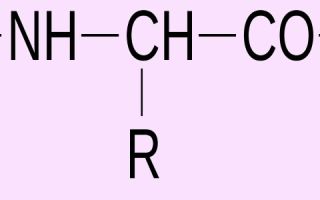Proteins (proteins, polypeptides) are high-molecular organic substances consisting of alpha amino acids connected in a chain by a peptide bond.
Content
Digestion of proteins
Proteins begin to break down in the stomach, the process is completed in the small intestine. Undigested proteins enter the large intestine, where they start the process of putrefaction; the products of putrefaction enter the bloodstream during absorption, then into the liver, where they are disinfected, and then excreted with liquid through the kidneys in the urine.
broken down during digestion are absorbed into the blood in the small intestine and used in the liver and body cells for the biosynthesis of body-specific proteins.
The importance of protein foods for the body
The body is not able to accumulate protein reserves and at any given time has only a small reserve. The only source of protein for the formation of amino acids is food.
There are 8 so-called essential amino acids. They cannot be synthesized by the body and must be contained in consumed foods.
A study of the amino acid composition of various products showed that proteins of animal origin are more consistent with the structure of the human body. The amino acid composition of egg whites is considered ideal, as it is almost 100% digestible. The degree of protein absorption in milk (75-80%), fish (70-80%), etc. is also quite high.
Products of plant origin contain proteins of reduced biological value. Therefore, it is advisable to combine them with others. For example, the combination of wheat bread with milk makes their total amino acid value significantly higher.
Foods with the highest protein content
Data are provided on the protein content (g) per 100 g of product.
- Meat -14-20,
- fish – 12-16,
- eggs – 10.8,
- cheese – 30,
- milk – 5,
- bread – 5-10,
- potatoes – 1.7,
- beans – 19.6,
- soybean – 34,
- peas – 19.7.
Daily requirement
The daily requirement for protein depends on a person’s lifestyle and age. If the work is not associated with intense physical activity, then on average the body should receive 1-1.2 g of protein per 1 kg of body weight from food.
For some categories of people, the daily protein intake should be increased:
- pregnant women – 109,
- nursing mothers – 120,
- students – 113,
- athletes – 154 -171,
- men engaged in heavy physical labor – 132.
Functions
It is difficult to overestimate the role of proteins in the human body. They take an active part in the operation of almost all systems and perform such functions as:
- enzymatic - all enzymes in the human body are chemically proteins (simple or complex);
- hormonal - 50% of the hormones in the body by chemical nature are proteins (for example, insulin, somatotropin, follicle-stimulating hormone (FSH), etc.);
- receptor - on the surface of the membranes of target cells for interaction with hormones, drugs and other substances there are receptors, which are proteins in chemical nature;
- transport - the protein hemoglobin transports oxygen from the lungs to tissue cells, blood albumins transport medications, higher fatty acids, bilirubin and some hormones;
- structural - the membranes of all cells of the human body, mitochondrial membranes and others are a bilayer in which 50-75% proteins and 25-50% lipids;
- supporting-mechanical - bones, cartilage, ligaments are built from proteins of a special composition;
- contractile - muscles consist of specific proteins;
- gene regulatory - histone proteins, acidic proteins carry out regulation at the operon level in matrix biosynthesis;
- immunological - antibodies formed in the body in response to an infectious factor or vaccine, proteins by chemical nature, most often Ύ-globulins;
- hemostatic - out of 15 blood coagulation factors, 14 factors are proteins, the exception is IV - these are calcium ions, the factors of the anticoagulation system are proteins by chemical nature;
- neutralizing - proteins (especially milk) are able to bind to toxic substances and neutralize them, are able to bind to heavy metal ions, preventing their toxic effect;
- maintaining the acid-base state (ABS), since blood plasma proteins are amphoteric;
- creation of biopotentials of cell membranes and the inner membrane of mitochondria;
- energy - 1 g of protein, oxidizing to final products in the body (urea, carbon dioxide, water), gives 4.1 kcal of energy;
- maintaining oncotic pressure (part of the osmotic pressure of the blood created by plasma proteins) in the body.







